《西方思想经典》复习
- 格式:doc
- 大小:69.50 KB
- 文档页数:6
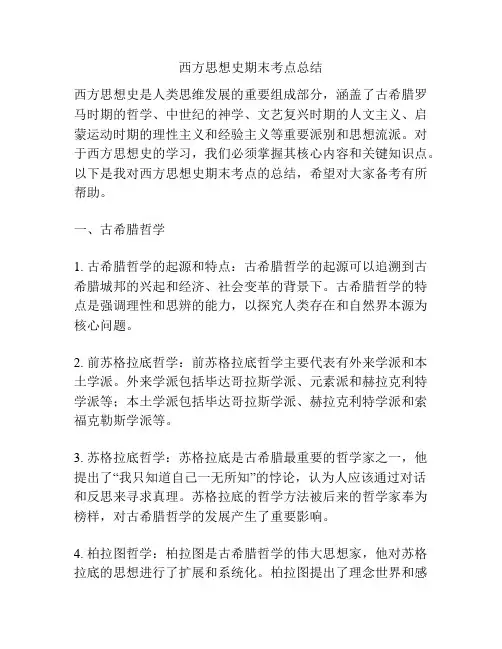
西方思想史期末考点总结西方思想史是人类思维发展的重要组成部分,涵盖了古希腊罗马时期的哲学、中世纪的神学、文艺复兴时期的人文主义、启蒙运动时期的理性主义和经验主义等重要派别和思想流派。
对于西方思想史的学习,我们必须掌握其核心内容和关键知识点。
以下是我对西方思想史期末考点的总结,希望对大家备考有所帮助。
一、古希腊哲学1. 古希腊哲学的起源和特点:古希腊哲学的起源可以追溯到古希腊城邦的兴起和经济、社会变革的背景下。
古希腊哲学的特点是强调理性和思辨的能力,以探究人类存在和自然界本源为核心问题。
2. 前苏格拉底哲学:前苏格拉底哲学主要代表有外来学派和本土学派。
外来学派包括毕达哥拉斯学派、元素派和赫拉克利特学派等;本土学派包括毕达哥拉斯学派、赫拉克利特学派和索福克勒斯学派等。
3. 苏格拉底哲学:苏格拉底是古希腊最重要的哲学家之一,他提出了“我只知道自己一无所知”的悖论,认为人应该通过对话和反思来寻求真理。
苏格拉底的哲学方法被后来的哲学家奉为榜样,对古希腊哲学的发展产生了重要影响。
4. 柏拉图哲学:柏拉图是古希腊哲学的伟大思想家,他对苏格拉底的思想进行了扩展和系统化。
柏拉图提出了理念世界和感观世界的区分,认为理念是真实和不变的,而感观世界是虚幻和多变的。
柏拉图的理念哲学对后世影响深远,成为了西方哲学的重要传统。
5. 亚里士多德哲学:亚里士多德是柏拉图的学生,他对柏拉图的思想进行了批判和发展。
亚里士多德提出了形式和物质的概念,并将逻辑学作为哲学研究的基础。
他的哲学体系涉及到形而上学、伦理学、政治学等多个领域。
二、中世纪哲学1. 基督教哲学:中世纪哲学主要是以基督教神学为基础的哲学体系。
中世纪哲学家将信仰和理性结合起来,探讨神学和哲学的关系,以及人的灵魂和上帝的关系等问题。
2. 童罗米哲学:童罗米是中世纪最重要的哲学家之一,他提出了“信仰之路和哲学之路是一致的”这一观点,主张用哲学推理来证明信仰的合理性。
3. 斯多亚哲学:斯多亚是中世纪哲学的代表性人物,他主张通过信仰来认识上帝和真理,对哲学的探究持怀疑态度。
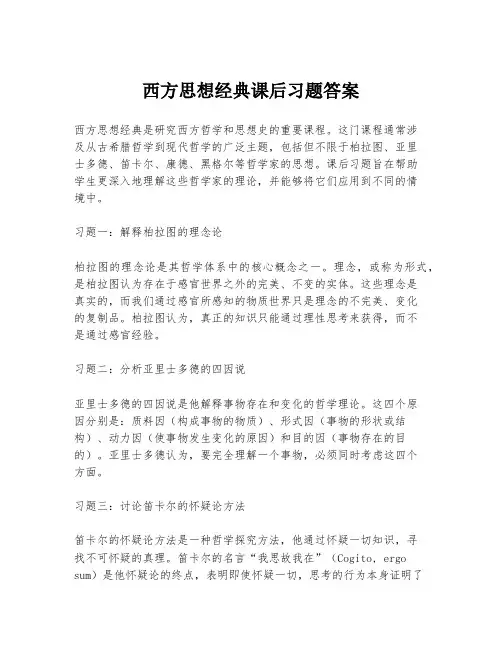
西方思想经典课后习题答案西方思想经典是研究西方哲学和思想史的重要课程。
这门课程通常涉及从古希腊哲学到现代哲学的广泛主题,包括但不限于柏拉图、亚里士多德、笛卡尔、康德、黑格尔等哲学家的思想。
课后习题旨在帮助学生更深入地理解这些哲学家的理论,并能够将它们应用到不同的情境中。
习题一:解释柏拉图的理念论柏拉图的理念论是其哲学体系中的核心概念之一。
理念,或称为形式,是柏拉图认为存在于感官世界之外的完美、不变的实体。
这些理念是真实的,而我们通过感官所感知的物质世界只是理念的不完美、变化的复制品。
柏拉图认为,真正的知识只能通过理性思考来获得,而不是通过感官经验。
习题二:分析亚里士多德的四因说亚里士多德的四因说是他解释事物存在和变化的哲学理论。
这四个原因分别是:质料因(构成事物的物质)、形式因(事物的形状或结构)、动力因(使事物发生变化的原因)和目的因(事物存在的目的)。
亚里士多德认为,要完全理解一个事物,必须同时考虑这四个方面。
习题三:讨论笛卡尔的怀疑论方法笛卡尔的怀疑论方法是一种哲学探究方法,他通过怀疑一切知识,寻找不可怀疑的真理。
笛卡尔的名言“我思故我在”(Cogito, ergo sum)是他怀疑论的终点,表明即使怀疑一切,思考的行为本身证明了思考者的存在。
习题四:解释康德的先验哲学康德的先验哲学是他在《纯粹理性批判》中提出的理论。
康德区分了先验知识(不依赖于经验的知识)和后验知识(基于经验的知识)。
他认为,我们的知识结构和范畴是先验的,它们是我们理解和组织经验的基础。
康德的哲学旨在解决理性主义和经验主义之间的矛盾。
习题五:阐述黑格尔的辩证法黑格尔的辩证法是他哲学体系中的核心概念。
辩证法是一种思维方法,它认为事物的发展是通过矛盾的对立统一来实现的。
黑格尔将这一过程描述为“正-反-合”,即一个概念(正)产生其对立面(反),然后通过解决这些对立来达到更高级的统一(合)。
结束语:通过深入研究西方思想经典,我们不仅能够理解历史上伟大哲学家的思想,还能够学会如何将这些思想应用于当代问题的分析中。
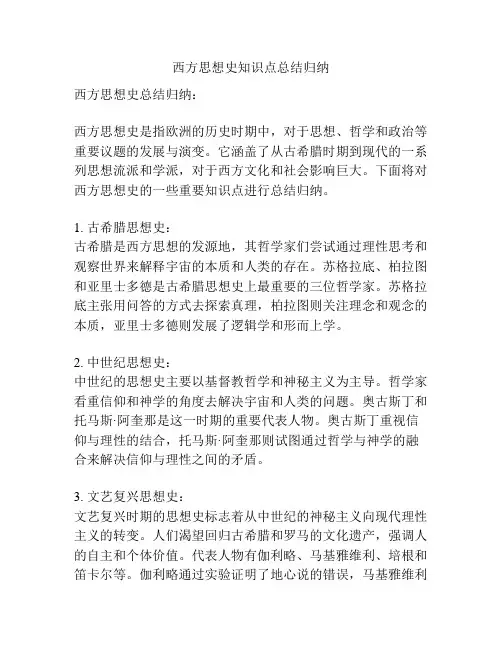
西方思想史知识点总结归纳西方思想史总结归纳:西方思想史是指欧洲的历史时期中,对于思想、哲学和政治等重要议题的发展与演变。
它涵盖了从古希腊时期到现代的一系列思想流派和学派,对于西方文化和社会影响巨大。
下面将对西方思想史的一些重要知识点进行总结归纳。
1. 古希腊思想史:古希腊是西方思想的发源地,其哲学家们尝试通过理性思考和观察世界来解释宇宙的本质和人类的存在。
苏格拉底、柏拉图和亚里士多德是古希腊思想史上最重要的三位哲学家。
苏格拉底主张用问答的方式去探索真理,柏拉图则关注理念和观念的本质,亚里士多德则发展了逻辑学和形而上学。
2. 中世纪思想史:中世纪的思想史主要以基督教哲学和神秘主义为主导。
哲学家看重信仰和神学的角度去解决宇宙和人类的问题。
奥古斯丁和托马斯·阿奎那是这一时期的重要代表人物。
奥古斯丁重视信仰与理性的结合,托马斯·阿奎那则试图通过哲学与神学的融合来解决信仰与理性之间的矛盾。
3. 文艺复兴思想史:文艺复兴时期的思想史标志着从中世纪的神秘主义向现代理性主义的转变。
人们渴望回归古希腊和罗马的文化遗产,强调人的自主和个体价值。
代表人物有伽利略、马基雅维利、培根和笛卡尔等。
伽利略通过实验证明了地心说的错误,马基雅维利提出政治上的现实主义和权力观念,培根发展了实证主义的科学方法论,笛卡尔强调人类的理性思维和怀疑论。
4. 启蒙思想史:启蒙时代是18世纪欧洲的一次思想运动,旨在通过理性和自由来改革社会和政治。
代表人物有洛克、卢梭和伏尔泰等。
洛克认为人类天生平等、自由和有权利。
卢梭关注社会契约论和对不平等的批判。
伏尔泰则强调言论自由和宗教宽容。
5. 德国哲学史:德国哲学史是19世纪欧洲思想的重要篇章,受到康德、黑格尔和尼采等哲学家的影响。
康德试图解决理性和经验之间的矛盾,黑格尔强调理念与历史的发展,尼采则强调个人意志和力量,批判了传统道德和宗教观念。
6. 现代思想史:现代思想史是20世纪以来的一系列思潮和学派的集合,包括存在主义、结构主义、后现代主义和分析哲学等。
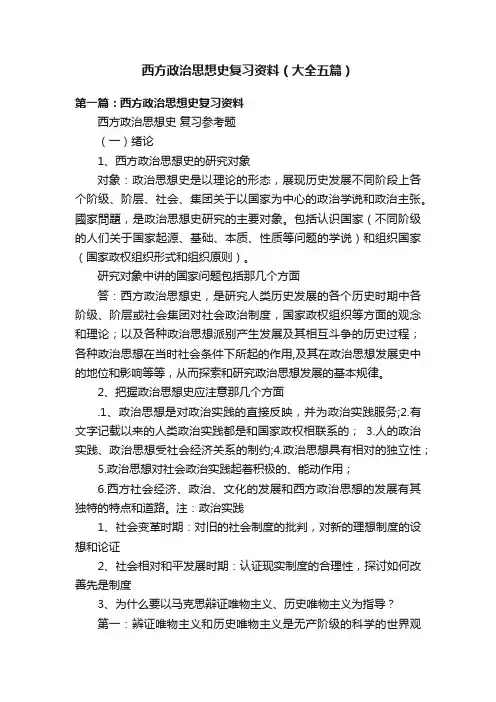
西方政治思想史复习资料(大全五篇)第一篇:西方政治思想史复习资料西方政治思想史复习参考题(一)绪论1、西方政治思想史的研究对象对象:政治思想史是以理论的形态,展现历史发展不同阶段上各个阶级、阶层、社会、集团关于以国家为中心的政治学说和政治主张。
國家問題,是政治思想史研究的主要对象。
包括认识国家(不同阶级的人们关于国家起源、基础、本质、性质等问题的学说)和组织国家(国家政权组织形式和组织原则)。
研究对象中讲的国家问题包括那几个方面答:西方政治思想史,是研究人类历史发展的各个历史时期中各阶级、阶层或社会集团对社会政治制度,国家政权组织等方面的观念和理论;以及各种政治思想派别产生发展及其相互斗争的历史过程;各种政治思想在当时社会条件下所起的作用,及其在政治思想发展史中的地位和影响等等,从而探索和研究政治思想发展的基本规律。
2、把握政治思想史应注意那几个方面.1、政治思想是对政治实践的直接反映,并为政治实践服务;2.有文字记载以来的人类政治实践都是和国家政权相联系的;3.人的政治实践、政治思想受社会经济关系的制约;4.政治思想具有相对的独立性;5.政治思想对社会政治实践起着积极的、能动作用;6.西方社会经济、政治、文化的发展和西方政治思想的发展有其独特的特点和道路。
注:政治实践1、社会变革时期:对旧的社会制度的批判,对新的理想制度的设想和论证2、社会相对和平发展时期:认证现实制度的合理性,探讨如何改善先是制度3、为什么要以马克思辩证唯物主义、历史唯物主义为指导?第一:辨证唯物主义和历史唯物主义是无产阶级的科学的世界观和方法论,它既是学习西方政治思想史的指导思想,又是学习西方政治思想史的科学方法。
第二:必须坚持阶级分析的方法。
第三:坚持马克思主义的历史唯物主义观点,把历史的和逻辑的统一起来,从当时的经济关系和阶级关系出发,研究个个政治思想家及其政治思想的产生和发展,以及他在历史上所起的作用和对以后各派别政治思想的影响。
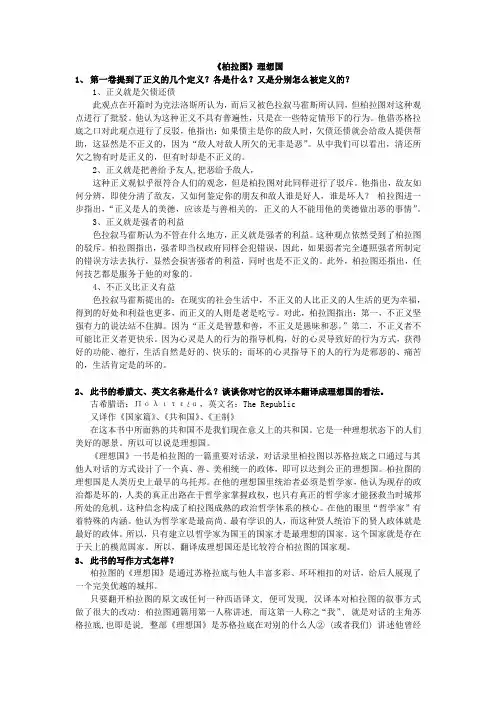
《柏拉图》理想国1、第一卷提到了正义的几个定义?各是什么?又是分别怎么被定义的?1、正义就是欠债还债此观点在开篇时为克法洛斯所认为,而后又被色拉叙马霍斯所认同,但柏拉图对这种观点进行了批驳。
他认为这种正义不具有普遍性,只是在一些特定情形下的行为。
他借苏格拉底之口对此观点进行了反驳,他指出:如果债主是你的敌人时,欠债还债就会给敌人提供帮助,这显然是不正义的,因为“敌人对敌人所欠的无非是恶”。
从中我们可以看出,清还所欠之物有时是正义的,但有时却是不正义的。
2、正义就是把善给予友人,把恶给予敌人,这种正义观似乎很符合人们的观念,但是柏拉图对此同样进行了驳斥。
他指出,敌友如何分辨,即使分清了敌友,又如何鉴定你的朋友和敌人谁是好人,谁是坏人?柏拉图进一步指出,“正义是人的美德,应该是与善相关的,正义的人不能用他的美德做出恶的事情”。
3、正义就是强者的利益色拉叙马霍斯认为不管在什么地方,正义就是强者的利益。
这种观点依然受到了柏拉图的驳斥。
柏拉图指出,强者即当权政府同样会犯错误,因此,如果弱者完全遵照强者所制定的错误方法去执行,显然会损害强者的利益,同时也是不正义的。
此外,柏拉图还指出,任何技艺都是服务于他的对象的。
4、不正义比正义有益色拉叙马霍斯提出的:在现实的社会生活中,不正义的人比正义的人生活的更为幸福,得到的好处和利益也更多,而正义的人则是老是吃亏。
对此,柏拉图指出:第一,不正义坚强有力的说法站不住脚。
因为“正义是智慧和善,不正义是愚昧和恶。
”第二,不正义者不可能比正义者更快乐。
因为心灵是人的行为的指导机构,好的心灵导致好的行为方式,获得好的功能、德行,生活自然是好的、快乐的;而坏的心灵指导下的人的行为是邪恶的、痛苦的,生活肯定是的坏的。
2、此书的希腊文、英文名称是什么?谈谈你对它的汉译本翻译成理想国的看法。
古希腊语:Πολιτεία,英文名:The Republic又译作《国家篇》、《共和国》、《王制》在这本书中所面熟的共和国不是我们现在意义上的共和国。
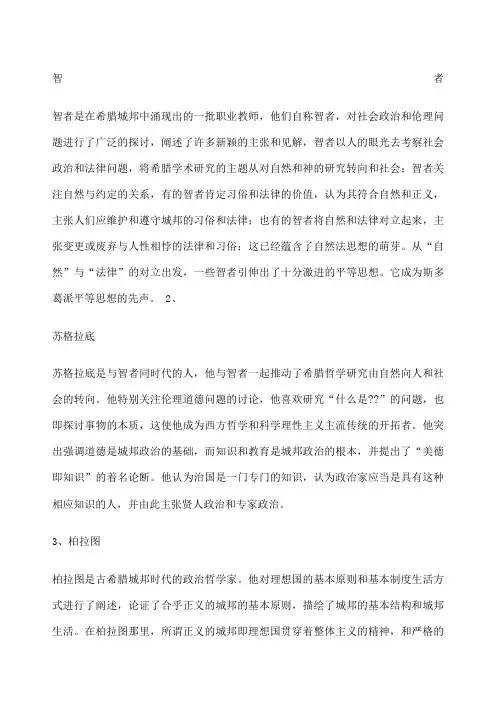
智者智者是在希腊城邦中涌现出的一批职业教师,他们自称智者,对社会政治和伦理问题进行了广泛的探讨,阐述了许多新颖的主张和见解,智者以人的眼光去考察社会政治和法律问题,将希腊学术研究的主题从对自然和神的研究转向和社会;智者关注自然与约定的关系,有的智者肯定习俗和法律的价值,认为其符合自然和正义,主张人们应维护和遵守城邦的习俗和法律;也有的智者将自然和法律对立起来,主张变更或废弃与人性相悖的法律和习俗;这已经蕴含了自然法思想的萌芽。
从“自然”与“法律”的对立出发,一些智者引伸出了十分激进的平等思想。
它成为斯多葛派平等思想的先声。
2、苏格拉底苏格拉底是与智者同时代的人,他与智者一起推动了希腊哲学研究由自然向人和社会的转向。
他特别关注伦理道德问题的讨论,他喜欢研究“什么是??”的问题,也即探讨事物的本质,这使他成为西方哲学和科学理性主义主流传统的开拓者。
他突出强调道德是城邦政治的基础,而知识和教育是城邦政治的根本,并提出了“美德即知识”的着名论断。
他认为治国是一门专门的知识,认为政治家应当是具有这种相应知识的人,并由此主张贤人政治和专家政治。
3、柏拉图柏拉图是古希腊城邦时代的政治哲学家。
他对理想国的基本原则和基本制度生活方式进行了阐述,论证了合乎正义的城邦的基本原则,描绘了城邦的基本结构和城邦生活。
在柏拉图那里,所谓正义的城邦即理想国贯穿着整体主义的精神,和严格的社会分工的原则,柏拉图理想国的核心内容是哲学家执政治国,柏拉图以社会分工理论为基础,主张把政治统治权交给哲学家,把现实国家改造成理想国家。
4、哲学王柏拉图理想国家的核心内容是哲学家执政。
他认为只有哲学家才能达到对国家理念的认识,知道如何治理国家,同时,也只有他们,能够用自己的品德改造城邦公民恶劣的品性,由此他以社会分工理论为基础,主张把政治统治权完全交给少数政治家,把将现实国家改造成理想国家的希望寄托在哲学家治国上,主张由哲学家垄断城邦的全部权力,将哲学家置于等级结构的顶端,即哲学家为王(哲学王)。

西方思想知识点总结西方思想是指从古希腊开始,通过一系列哲学家、宗教家、科学家、政治家等的思考和实践,形成的一套独特的思维模式和文化体系。
西方思想对于人类社会和文明的发展有着重要的影响,其知识点包括哲学、宗教、科学、政治、文学等方面。
下面将对这些知识点进行总结。
哲学是西方思想的核心内容之一。
古希腊的哲学家如苏格拉底、柏拉图、亚里士多德等提出了许多重要的思想理论,例如“人是万物的尺度”、“美善真理”的观念,强调了道德、伦理的重要性。
中世纪的哲学家如奥古斯丁、托马斯·阿奎纳等探讨了上帝、信仰、原罪等问题,形成了基督教哲学的基础。
启蒙时代的哲学家如笛卡尔、洛克、休谟等提出了理性、经验、自由、平等等思想,为后来的现代哲学打下了基础。
宗教也是西方思想的重要组成部分。
基督教是西方文明的一大特点,其价值观念渗透到了政治、法律、道德等各个方面。
宗教在西方社会起到了统一、安定社会的作用,也为人们提供了信仰和精神寄托。
在中世纪,天主教和东正教在欧洲的影响力非常大,而在16世纪的宗教改革中,新教兴起,使得欧洲的宗教局势发生了巨大变革。
科学是西方思想的重要组成部分之一。
古希腊的科学家如阿基米德、伽利略等为后来的科学研究打下了基础。
伽利略提出了地心说的质疑,并通过实验得出了自然规律的结论,奠定了现代科学研究的方法论。
启蒙时代的科学家如牛顿、达尔文等通过观察和实验,发现了一系列自然规律,使得人们对自然和人类的认识有了质的飞跃。
政治是西方思想的重要组成部分之一。
古希腊的政治家如柏拉图、亚里士多德等提出了君主制、共和制等政体理论,并试图构建理想的政治制度。
17世纪的政治思想家如洛克、孟德斯鸠等提出了社会契约论和人民主权的概念,推动了民主政治的发展。
19世纪的马克思主义则提出了阶级斗争、无产阶级专政的理论,对世界政治产生了重要影响。
文学是西方思想中的重要组成部分之一。
古希腊的史诗如《荷马史诗》、古希腊悲剧如《俄狄浦斯王》等影响了后来的文学创作。
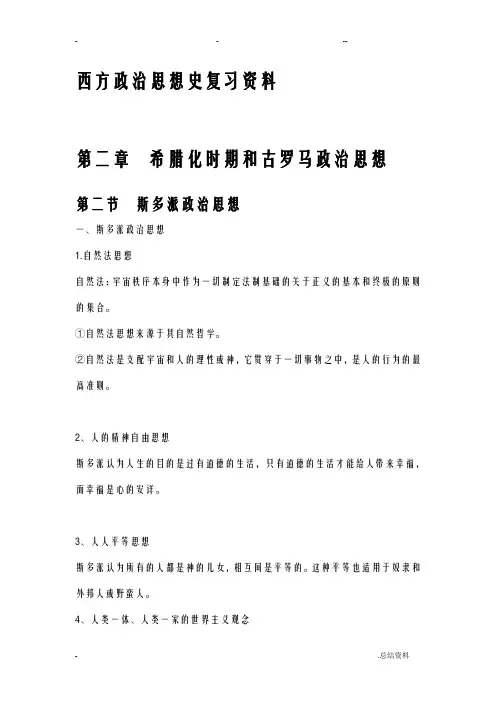
西方政治思想史复习资料第二章希腊化时期和古罗马政治思想第二节斯多派政治思想一、斯多派政治思想1.自然法思想自然法:宇宙秩序本身中作为一切制定法制基础的关于正义的基本和终极的原则的集合。
①自然法思想来源于其自然哲学。
②自然法是支配宇宙和人的理性或神,它贯穿于一切事物之中,是人的行为的最高准则。
2、人的精神自由思想斯多派认为人生的目的是过有道德的生活,只有道德的生活才能给人带来幸福,而幸福是心的安详。
3、人人平等思想斯多派认为所有的人都是神的儿女,相互间是平等的。
这种平等也适用于奴隶和外邦人或野蛮人。
4、人类一体、人类一家的世界主义观念人都受自然法支配人类一体、人类一家二、斯多派政治思想的影响1.奠定了西方思想史上绵延不绝的自然法传统。
2.人人平等思想打破了城邦时代对人的各种身份的偏见,确立了新型的人与人的关系。
3.人的自由思想确立了衡量人的价值的新标准——人的精神特征和道德水准。
第四节罗马法学对政治思想影响一、罗马法和罗马法学对政治哲学的影响1.首次产生权利概念法律的目的是确定和保护权利2.引进并发展了自然法思想自然法是理想的法或法的理想,高于现实法律3.权利思维方式不承认没有权利的权力,权利是权力的合法性基础,权力必须以权利为依据第五节罗马基督教政治思想一、奥古斯丁神学政治思想(1)推崇信仰,贬低理性:上帝即真理和智慧,信仰上帝就把握了至上,拥有了幸福。
(2)原罪论与恩典论(原罪救赎说)(3)奴役是必要的,奴役是对罪的惩罚(4)推崇上帝之城,贬低世人之城(5)推崇教会,贬低国家,给国家以有限度的承认。
第三章中世纪西欧政治思想第一节5-10世纪西欧的社会政治背景一、政治经济社会状况1、采邑制基础上的等级制度2、多元权力体系(1)纵向上看:君主以下,层层结成领主与陪臣的关系①国王与其陪臣间的关系是以契约为基础的相互的权利义务关系。
并没有对陪臣绝对的控制支配权。
②政治版图十分破碎:封地犬牙交错;(2) 从横向上看:政教二元权力体系,教会多处于优势地位。
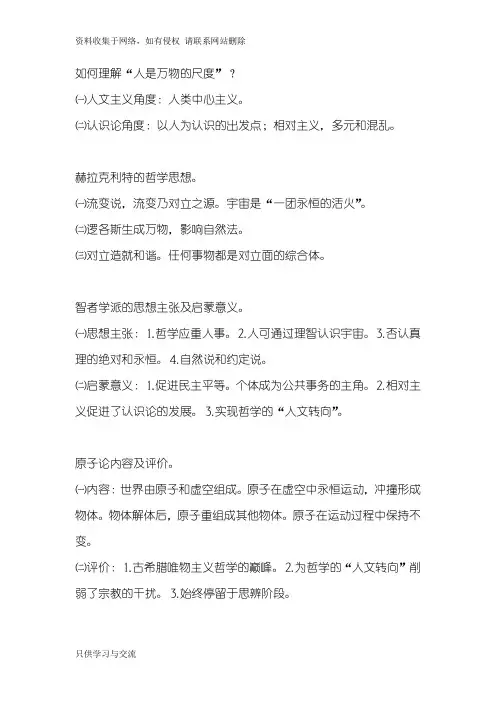
如何理解“人是万物的尺度”?㈠人文主义角度:人类中心主义。
㈡认识论角度:以人为认识的出发点;相对主义,多元和混乱。
赫拉克利特的哲学思想。
㈠流变说,流变乃对立之源。
宇宙是“一团永恒的活火”。
㈡逻各斯生成万物,影响自然法。
㈢对立造就和谐。
任何事物都是对立面的综合体。
智者学派的思想主张及启蒙意义。
㈠思想主张:⒈哲学应重人事。
⒉人可通过理智认识宇宙。
⒊否认真理的绝对和永恒。
⒋自然说和约定说。
㈡启蒙意义:⒈促进民主平等。
个体成为公共事务的主角。
⒉相对主义促进了认识论的发展。
⒊实现哲学的“人文转向”。
原子论内容及评价。
㈠内容:世界由原子和虚空组成。
原子在虚空中永恒运动,冲撞形成物体。
物体解体后,原子重组成其他物体。
原子在运动过程中保持不变。
㈡评价:⒈古希腊唯物主义哲学的巅峰。
⒉为哲学的“人文转向”削弱了宗教的干扰。
⒊始终停留于思辨阶段。
苏格拉底的思想观点及评价。
㈠思想观点:⒈美德即知识,邪恶即无知。
⒉守法即正义。
法律应符合城邦及公民利益。
⒊理性至上。
理性神的理论。
⒋认识你自己,成为你自己。
⒌知识源于内心,自我求索见真知。
㈡评价:⒈奠定爱智思想和道德价值观。
⒉自然法雏形。
⒊理性至上,启蒙运动的先声。
⒋雅典民主政体的改良者。
⒌思想缺乏妥协性。
迷信美德。
理念论内容及评价。
㈠内容:宇宙存在两个世界,感官能感觉到的现象世界和无形的理念世界。
真正的存在都在理念世界,现象世界的物体都是虚假的,只不过是理念的歪曲摹本和影子。
㈡评价:⒈最早提出了共相理论。
⒉深化人们的认识,引导对规律和本质等内在属性的研究。
⒊粗糙而不严密。
迷信形而上学。
亚里士多德的形而上学理论及评价。
㈠内容:⒈形而上学的本义:在物理学之后,即超越经验领域到达靠思辨把握的神圣领域,研究存在物的本质。
⒉第一实体的双重含义,一是个别事物,二是普遍事物。
⒊实体来源于形式与质料的结合。
⒋运动是形式与质料接触的产物。
第一推动力是非物质的存在。
㈡评价:⒈实体是哲学史上诸多研究对象的首次统一。
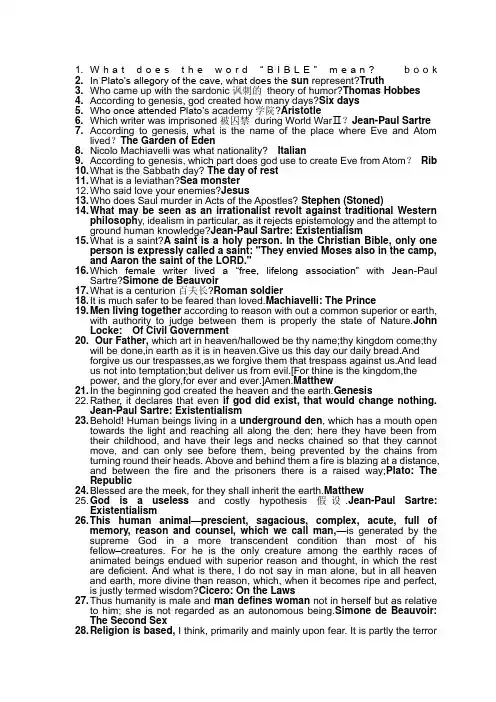
1. W h a t d o e s t h e w o r d“B I B L E”m e a n?b o o k2. In Plato’s allegory of the cave, what does the sun represent?Truth3. Who came up with the sardonic讽刺的theory of humor?Thomas Hobbes4. According to genesis, god created how many days?Six days5. Who once attended Plato’s academy学院?Aristotle6. Which writer was imprisoned被囚禁during World WarⅡ?Jean-Paul Sartre7. According to genesis, what is the name of the place where Eve and Atomlived?The Garden of Eden8. Nicolo Machiavelli was what nationality? Italian9. According to genesis, which part does god use to create Eve from Atom?Rib10. What is the Sabbath day? The day of rest11. What is a leviathan?Sea monster12. Who said love your enemies?Jesus13. Who does Saul murder in Acts of the Apostles? Stephen (Stoned)14. What may be seen as an irrationalist revolt against traditional Westernphilosoph y, idealism in particular, as it rejects epistemology and the attempt to ground human knowledge?Jean-Paul Sartre: Existentialism15. What is a saint?A saint is a holy person.In the Christian Bible, only oneperson is expressly called a saint: "They envied Moses also in the camp, and Aaron the saint of the LORD."16. Which female writer lived a “free, lifelong association” with Jean-PaulSartre?Simone de Beauvoir17. What is a centurion百夫长?Roman soldier18. It is much safer to be feared than loved.Machiavelli: The Prince19. Men living together according to reason with out a common superior or earth,with authority to judge between them is properly the state of Nature.John Locke: Of Civil Government20. Our Father, which art in heaven/hallowed be thy name;thy kingdom come;thywill be done,in earth as it is in heaven.Give us this day our daily bread.And forgive us our trespasses,as we forgive them that trespass against us.And lead us not into temptation;but deliver us from evil.[For thine is the kingdom,thepower, and the glory,for ever and ever.]Amen.Matthew21. In the beginning god created the heaven and the earth.Genesis22. Rather, it declares that even if god did exist, that would change nothing.Jean-Paul Sartre: Existentialism23. Behold! Human beings living in a underground den, which has a mouth opentowards the light and reaching all along the den; here they have been from their childhood, and have their legs and necks chained so that they cannot move, and can only see before them, being prevented by the chains from turning round their heads. Above and behind them a fire is blazing at a distance, and between the fire and the prisoners there is a raised way;Plato: The Republic24. Blessed are the meek, for they shall inherit the earth.Matthew25. God is a useless and costly hypothesis假设.Jean-Paul Sartre:Existentialism26. This human animal—prescient, sagacious, complex, acute, full ofmemory, reason and counsel, which we call man,—is generated by the supreme God in a more transcendent condition than most of his fellow–creatures. For he is the only creature among the earthly races of animated beings endued with superior reason and thought, in which the rest are deficient. And what is there, I do not say in man alone, but in all heaven and earth, more divine than reason, which, when it becomes ripe and perfect, is justly termed wisdom?Cicero: On the Laws27. Thus humanity is male and man defines woman not in herself but as relativeto him; she is not regarded as an autonomous being.Simone de Beauvoir: The Second Sex28. Religion is based, I think, primarily and mainly upon fear. It is partly the terrorof the unknown and partly, as I have said, the wish to feel that you have a kind of elder brother who will stand by you in all your troubles and disputes.Bertrand Russell: Why I Am Not a Christian29. For my part I consider that it is better to be adventurous than cautious,because fortune is a woman, and if you wish to keep her under it is necessary to beat and ill-use her; and it is seen that she allows herself to be mastered by the adventurous rather than by those who go to work more coldly. She is, therefore, always, woman-like, a lover of young men, because they are less cautious, more violent, and with more audacity command her.Nicolo Machiavelli: The Prince30. The existentialist does not think that man is going to help himself by findingin the world some omen by which to orient himself. Because he thinks that man will interpret the omen to suit himself. Therefore, he thinks that man, with no support and no aid, is condemned every moment to invent man. Jean-Paul Sartre: Existentialism31. The reason why men enter into society is the preservation of their property.(P280)John Locke: Of Civil Government32. Man is by nature a political animal. And therefore, men, even when they donot require one another's help, desire to live together; not but that they are also brought together by their common interests in proportion as they severally attain to any measure of well-being. This is certainly the chief end, both of individuals and of states.Aristotle: The Politics33. A PRINCE ought to have no other aim or thought, nor select anything else forhis study, than war and its rules and discipline; for this is the sole art that belongs to him who rules, and it is of such force that it not only upholds those who are born princes, but it often enables men to rise from a private station to that rank.Nicolo Machiavelli: The Prince34. By pursuing his own interest he frequently promotes that of the society moreeffectually than when he really intends to promote it.Adam smith: The Wealth of Nations35. And if any mischief follow, then thou shalt give life for life, Eye for eye, toothfor tooth, hand for hand, foot for foot, Burning for burning, wound for wound, stripe for stripe. Exodus36. First, that men are continually in competition for honor and dignity, whichthese creatures are not; and consequently amongst men there ariseth on that ground, envy, and hatred, and finally war; but amongst these not so.Thomas Hobbes: Leviathan37. And they were all filled with the Holy Ghost, and began to speak with othertongues, as the Spirit gave them utterance. And there were dwelling at Jerusalem Jews, devout men, out of every nation under heaven.Acts of the Apostles38. Whereas the truth is that the State in which the rulers are most reluctant togovern is always the best and most quietly governed, and the State in which they are most eager, the worst.Plato: The Republic39. So that in the nature of man, we find three principal cause of quarrel吵架.First competition; secondly, difference; thirdly, glory. The first maketh men invade for gain; the second, for safety; and the third, for reputation.Thomas Hobbes: Leviathan●The Bible (Genesis, Exodus, Gospel According to Matthew, Acts of the Apostles)●Bertrand Russell:Why I am Not a Christian 上帝不存在,基督不是一个真正慈悲的人。
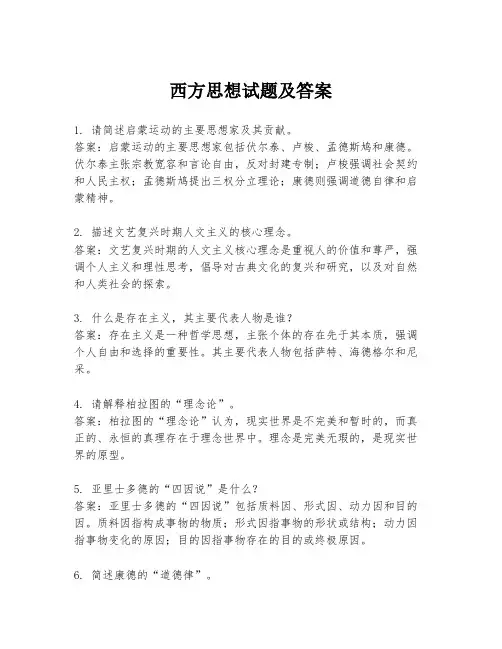
西方思想试题及答案1. 请简述启蒙运动的主要思想家及其贡献。
答案:启蒙运动的主要思想家包括伏尔泰、卢梭、孟德斯鸠和康德。
伏尔泰主张宗教宽容和言论自由,反对封建专制;卢梭强调社会契约和人民主权;孟德斯鸠提出三权分立理论;康德则强调道德自律和启蒙精神。
2. 描述文艺复兴时期人文主义的核心理念。
答案:文艺复兴时期的人文主义核心理念是重视人的价值和尊严,强调个人主义和理性思考,倡导对古典文化的复兴和研究,以及对自然和人类社会的探索。
3. 什么是存在主义,其主要代表人物是谁?答案:存在主义是一种哲学思想,主张个体的存在先于其本质,强调个人自由和选择的重要性。
其主要代表人物包括萨特、海德格尔和尼采。
4. 请解释柏拉图的“理念论”。
答案:柏拉图的“理念论”认为,现实世界是不完美和暂时的,而真正的、永恒的真理存在于理念世界中。
理念是完美无瑕的,是现实世界的原型。
5. 亚里士多德的“四因说”是什么?答案:亚里士多德的“四因说”包括质料因、形式因、动力因和目的因。
质料因指构成事物的物质;形式因指事物的形状或结构;动力因指事物变化的原因;目的因指事物存在的目的或终极原因。
6. 简述康德的“道德律”。
答案:康德的“道德律”主张道德行为应基于普遍性原则,即“行为的准则应当能够成为普遍法则”。
他强调道德行为的动机应出于对道德法则的尊重,而非出于对结果的期望。
7. 请阐述马克斯·韦伯的“理性化”理论。
答案:马克斯·韦伯的“理性化”理论认为现代社会的特征是理性化过程,即人们的行为和社会组织越来越基于逻辑和理性原则,而非传统或情感。
这导致了官僚制度的兴起和个人主义的增强。
8. 什么是尼采的“超人”概念?答案:尼采的“超人”概念是对传统道德和价值观的批判。
他认为超人是超越了传统道德束缚和平庸价值观的个体,能够创造自己的价值观和生活方式。
9. 请解释黑格尔的“辩证法”。
答案:黑格尔的“辩证法”是一种哲学方法,认为事物的发展是通过矛盾和对立的统一来实现的。
Leviticus 利未记Numbers 民数记Deuteronomy 申命记Genesis 创世记Exodus 出埃及记Matthew, Mark, Luke, JohnHebrew patriarchs(创始人):Abraham, Isaac and JacobGod formed man of the dust of the Ground, and breathed into his nostrils(鼻孔) the breathe of life, and man became a living soul.The Acts of the Apostles 使徒行传The Epistles 使教书信The Revelation 启示录Gospel According to Matthew –New TestamentBeatitudes(八福词)Blessed are the poor in spirit; Blessed are they that mourn(哀悼); Blessed are the meek(温驯);Blessed are they which do hunger and thirst after righteousness; Blessed are the merciful; Blessed are the pure in heart(清心寡欲);Blessed are the peace-maker; Blessed are they which persecuted for righteousness’s sake.Salt and light 将真信徒比作盐和光House upon a rock 聪明的人把房子建在岩石上House upon the sand 无知的人把房子建在沙土之上Salt of the earth 精英份子Miracle and wonders and signs: pervasive activities 无所不在的行为Thunders and lightning: God’s mighty power⑦a jealous God: a God who tolerant no rivals⑥original sin: is the Christian doctrine of humanity’s state of sin resulting from the fall of man, naturally the sin of eating fruits from the tree of knowledge of God and evil stemming from Adam’s rebelling in Eden. Saint Augustine link this to human sexuality.2. What are the difference between the God in the Old Testament and Jesus in the New Testament?God is cruel and violent; Jesus is merciful and gracious. Curses and blesses, fearing God and Loving God.To the glory, that may Greece;And the grandeur that was Roman!The Dark Age(1000—750?BC): lack of written recordsArchaic Age(750—480BC) 古代时期Classical Age (480—323BC)古典时期The Apology申辩论—Socrates(469—399BC)Socrates’s Accuser: Meletus and Augtus and Lycon\Death is a dreamless sleep and a relocation to another placeSocrates is accused of1. Corrupting the young2. Not believing in the gods of the city3. Believing in other spiritsPlato(428—347BC) established the first “European University”, the Academy in Athens.Forms: Forms are those changeless, eternal, and nonmaterial essences or patterns of which the actual visible objects we see are only poor copies.There is the Form of the Triangle, and all the triangles we see are mere copies of that Form.Allegory of the Cave :①Imprisonment in the cavePlato has Socrates describe a gathering of people who have lived chained to the wall of a cave all of their lives, facing a blank wall. The people watch shadows projected on the wall from things passing in front of a fire behind them, and they begin to give names to these shadows. The shadows are as close as the prisoners get to viewing reality.②Departure from the cavePlato then supposes that one prisoner is freed, being forced to turn and see the fire. The light would hurt his eyes and make it hard for him to see the objects that are casting the shadows. But slowly, his eyes adjust to the light of the sun. First he can only see shadows. Gradually he can see the reflections of people and things in water and then later see the people and things themselves. Eventually he is able to look at the stars and moon at night until finally he can look upon the sun itself.③Return to the cavePlato continues, saying that the freed prisoner would think that the real world was superior to the world he experienced in the cave, he would want to bring his fellow cave dwellers out of the cave and into the sunlight. The returning prisoner, whose eyes have become acclimated to the light of the sun, would be blind when here-enters the cave, just as he was when he was first exposed to the sun. The prisoners, according to Socrates, would infer from the returning man's blindness that the journey out of the cave had harmed him and that they should not undertake asimilar journey. Socrates concludes that the prisoners, if they were able, would therefore reach out and kill anyone who attempted to drag them out of the caveThe world we see are the world of Forms. Knowledge of forms is innate, they are abstract and we know them through our soul, through intuition. Every object we see copies a Form. These objects are just shadow of a Form. We can come to grasp the Forms with our heads cultivated by instructors.Axial Age: Karl Jaspers created the term “Axial Age”of human civilization for the period 800-200BC exemplified by world’s greatest spiritual leaders in The Origin and God of History.The most extraordinary events are concentrated in this period. Everything implied during these few centuries almost simultaneously in China, India and the West, without any one of these regions knowing of the others.14.What is Plato’s ideal state composed of?The lowest class (merchant class) are governed by their appetite, the soldier (military class) is governed by his will, the philosophic person is governed by reason.In the best form of government, which Plato considers to be aristocracy, justice occurs when each of these types of person does his a appointed task; this means that justice is served when everyone keeps his or her place. This is ruled by a group of carefully trained men and women over fifty, who are all philosophersLyceum 逍遥学派10. Differences between Plato and Aristotle?Plato observed the world with the way of mathematics. He is an idealist and interested in Forms. He applied deduction (from general to specific) and looked for the ideal state. Aristotle was more interested in sense and became an empiricist with the way of biology. He applied the way of induction (from specific to general), seeking solution problems of living.The Politics 政治学--Aristotle15. What are the true forms and perversions of government according to Aristotle?The true forms of government are those in which the one, or the few, or the many, govern with a view to the common interest. But government which rule with a view to the private interest, whether of the one or of the few, or of the many, are perversions, and the perversion are as follows of royalty, tyranny; of aristocracy(贵族政体), oligarchy(寡头政府); of constitution government, democracy.Doctrine of mean 中庸application of reason to fulfill one’s innate abilities.中庸the nature of happiness, asserting that human happiness derives from“self-sufficiency”On the Laws – Cicero (Roman 106—43BC)The principle of natural law was open to reason and human judgments3. What is the law meant in Cicero’s On the Laws? How does Cicero’s law different from the law we meant today?⑴There are 3 categories of law.Citizen law:private law and public lawLaw of nations: beginning of international lawNatural law:there were universal rules of conduct that flow from people as rational beings, irrespective of where or when they live.⒅⒅.Cosmopolitanism:All people are citizens of the same human community.❝To look at the world process as a drama is to admit that everyone has a role in it.❝What relates people to each other is the fact that each person shares a common element.❝It is as though the Logos is a main telephone line and all people are on a conference call, therefore connecting God to all people and people to eachother.Ethics 伦理主义13. The Roman world contributed Jesus to Western civilization, but an equally important contribution is the Roman laws, military art and civil administration. Justice is the bond of men in statesConstantine the Great 君士坦丁大帝Byzantium 拜占庭Constantinople 君士坦丁堡Istanbul 伊斯坦布尔The Early Middle Age(350—1050) The High Middle Age(1050—1300) The Late Middle Age(1300—1450)⒄the Patristic era(教父时期): The period extending from the beginning of the Christian speculation(思索) to the time of St. Augustine is known as the Patristic era in philosophy and theology. This era included Platonism and underestimated the importance of Aristotle.⒃Scholasticism(经院哲学):the philosophical and theological movement that attempted to use natural human reason.⒀the Age of Faith : During the Medieval Ages from the 5th century to the 15th centuryinEuropeanhistory there was no central government to keep the order. The only organization that seemed to unite Europe was the Christian church. Christianity took the lead in politics, law, art, andlearning for hundreds of years. It shaped people’s lives. That is why the Middle Ages is also called the “Age of Faith”The Enchiridion(手册)—St. Augustine (354—430)⒁The Enchiridion: It is a writing of St. Augustine. A Christian layman wanted a hand book(Enchiridion) which would sum up the essential Christian teaching in the briefest possible form. The shorted complete summary of the Christian faith Augustine said is that God is to be served by man in faith, hope and love. He proceeds to expand in an essay his answer that he acknowledged to be too brief. It is a “conscious effort of the theological magistrate of Western Church to stand on final ground of testimony to the Christian truth.” This “Enchiridion” or “manual” is a bold expression at the time of what we tend to accept as common talks today.⑸Free will: Evil or sin is the product of the will. In spite of the fact of original sin, we still posses the freedom of the will. But we use free will wrongly. Even when we choose rightly, we don’t possess the spiritual power to do the good we have chosen. We must have the help of God’s grace. Whereas evil is caused by free will, virtue is not the product of our will but of God’s grace.4. What is true liberty according to Augustine?Summa Contra Gentiles 反异教大全Thomas AquinasHe tries to build the consonance(协调) between philosopher’s quest for mundane (世俗)truth based on reason and Christian’s quest for divine truth based on revelation(启示). It is literally means summary against the Gentiles.The divine intellect surpasses the angelic intellect much more than the angelic surpasses the human.5. Why is reason alone unreliable according to Augustine?Three disadvantage would result if divine truth were left solely to the inquiry of reason: One is that would have knowledge of God; because very many are hindered(阻碍) from gathering the fruit of diligent (勤劳的) inquiry, which is the discovery of truth. The second disadvantage is that those who arrive at the discovery of the aforesaid truth would scarcely succeed in doing so after a long time. The third disadvantage is that much falsehood is mingled(混入) with the investigation of human reason, on account of the weakness of our intellect in forming its judgments, and by reason of admixture of phantasms(幻觉).6. ⑴Machiavelli wrote The Prince under the background of Italy of his time during which his country was political unrest, remaining divided, balkanized and eruptive state with foreign invasion.⑵From the view of consequentialism, it ends justify means.⑶Machiavelli stressed on rational, original thought with little traces of religious orientation.⑷It is also a clarion(号角) of nationalism and rationality⑸Machiavelli had his target audience : the prince who will raise, a banner Italy ready and willing to follow.Unit 6 .Martin Luther(Greman theologian and religious reformer): An Open Letter to the Christian Nobility 致基督教贵族的公开信Ninety-Five Theses 九十五条论纲We ought to go boldly forward to test all that they do or leave undone, according to our interpretation of the Scriptures, which rests on faithJohn Calvin :Institution of the Christian Religion 基督教要义He is a French theologian and most important figure in the second generation of the Protestant ReformationLutheranism Calvinism 加尔文主义Protestantism ①Luther’s idea of justification by faith 因信称义②Calvin’s notion of double predestination 双重预定the elect 选民salvation 得救And the unelect 弃民destruction 沉沦Pride was the beginning of all evil.Double Predestination: Eternal election, by which God has predestinated some to salvation, other to destruction.How did Calvin illustrate the relationship between prescience and predestination?The predestination by God adopts some to the hope of life, and adjudges others to eternal death, no man who would be thought pious(虔诚的) ventures simply to deny; but it is greatly caviled(挑剔) at , especially by those who make prescience its cause.Francis Bacon held that philosophy should be kept separate from theology, not intimately be blended with it as in Scholasticism.Francis Bacon : the most powerful mind of modern times.Novum Organum 新工具:Drew our attention to the importance of “method” or “instrument”by which we perceive things. The principle of Novum Organum include accurate observation and experimentation, calling for abandoning prejudices and preconceived attitudes, which he called idolsWhy are the four idols archenemy for Bacon?The Idols of the tribe (人的共同错误) have foundation in human nature itself, and in the tribe or race of men. The human understanding is like a false mirror, which, receiving rays irregularly, distorts and discolors the name of things by making its own nature with it.The Idols of the cave(个人专有错误) are the idols of individual man. For everyone(beside the errors common to human nature in general) has a cave or den of his own, which refracts(折射) and discolors the light of nature.The Idols of the marketplace(人云亦云的传闻) are idols formed by intercourse and associating of men with each other. The ill and unfit choice of words wonderfully obstructs the understanding.The Idols of the Theater are idols which have immigrated into one mind from the various dogmas of philosophies and also from wrong laws of demonstration. For all the received systems are but so many stage plays, representing worlds of their own creation after an unreal and scenic fashion.Rene Descartes(French) Discourse on Method 谈谈方法Descartes attempted to the rational deductive methods of science, and particularly of mathematic to philosophy.The power of forming a good judgment and of distinguishing the truth from the false is properly speaking that what is called Good sense or ReasonFollow the straight road.Those who proceed very slowly way, provided that they always follow the straight road, really advanced much faster than those who, though they run, forsake itWhat is the “Method” to Descartes and why is it important?Thomas Hobbes(English)is best known for his publication on individual security and the social contractLeviathan 利维坦Leviathan, a Hebrew name for huge monster, is represented in the Bible as crocodile, whale, or sea-serpent. Here it is symbol of an absolute state. Upon this image, Hobbes intended to build a comprehensive theory of government and social structure. It is the first great and comprehensive political philosophy produced by an English thinker.Leviathan is called commonwealth or state which is but an artificial man, though of greater stature and strength than the natural, for whose protection and defense in was intended. Covenant 协议John Locke founded the school of empiricism. 经验主义学派Two Treatises of Government 政府论两篇Of Civil Government 政府论He advanced a system of check and balance in governmentLegislative is more powerful than the executive or judicial.What is political power and law of nature according to John Locke?Political power was believed by John Locke to be a right of making laws, with penalties(处罚) of death, and consequently all less penalties for the regulating and preserving of property, and of employing the force of community in the execution of such laws, and in the defence of the commonwealth from foreign injury, and all this only for public good.The state of Nature has a law of nature to govern it, which obliges every one, and reason, which is that law, teaches all mankind who will but consult it, that being all equal and independent, no one ought to harm another in his life, health, liberty, or possessions; for man being all the workmanship of one omnipotent and infinitely wise Maker; all the servants of one sovereign Master, sent into the world by His order and about His business; they are His property, whose workmanship they are made to last during His, not one another’s pleasure.What does Classical Liberalism(经典自由主义) oppose?They argue for political, economic, and social reform:①they oppose feudal restraints that prevent individual from any change of social status, barriers such as censorship and arbitrary power(强制权力). ②In international affairs, they opposed domination by military consideration and the exploitation of native colonial people, and argued instead for a cosmopolitan policy of international cooperation. ③In economics, liberals have attached monopolies and mercantilist(重商主义) state policies that subject the economy to state control.④In religion, liberals fought against interference in the affairs of the state and attempts by religious pressure groups to influence public opinion.Adam Smith (British): father of modern economicsThe Wealth of Nations 国富论7.Why does Adam Smith oppose monopoly?The respect of the monopoly lead the officers of the army to oppose with the same zeal and unanimity any reduction in the numbers of forces with which master manufactures set themselves against every law that is likely to increase the number of their rivals in the home marker. This monopoly has so much increased the number of some particular tribes of them that, like an overgrown standing army, they have become formidable to the government, and upon many occasions intimidate the legislature.What is free trade?To explain this concept, Adam Smith proclaimed the principle of “invisible hand”. Every individual in pursuing his or her own good is led to achieve the good for all. Individuals become socialized, market oriented, class-bound. Therefore, any interference with free competition by government is almost certain to be injurious.⑽By pursuing his own interest, he frequently promotes that of the society more effectually than when he really intend to promote it.Unit 11.Jean-Jacques Rousseau (French)谈科学艺术对人类道德的影响The Social Contrast 社会契约论Confession 忏悔录What is Anti-Liberalism ?Distrust for the enlightenment ideals of reason and science. Appeal to return to the ideal of a simple, primitive society uncontaminated by modern civilization. It was based on a furtherance of the ideals of classical liberalism.A Discourse on the Moral Effects of the Arts and SciencesScience, art and social institution have corrupted human kind and that the nature or primitive, state is morally superior to the civilized state.The appearance of all the virtues, without being in possession of one of them.Men are perverse , but they would have been far worse, if they had had the misfortune to be born learned.Why is Rousseau critical of science and art?①Historical evidence: Rousseau pointed to historical evidence. Egypt was the mother of philosophy and the fine arts; soon she was conquered by Cambyses, and then successively by the Greeks, the Romans, the Arabs and finally the Turks. Greece, Rome②Conformity: Modern manners have made everyone conform in speech, dress, and attitude, always following the laws of fashion, so we no longer dare appear to be what we really are. The herd of humanity all act exactly alike, and so we never know even among our friends with whom we are dealing. Human relationships are now full of deceptions, whereas earlier people could easily see through one another, which prevented them from having many vices.③Differences: The danger to morality and to society caused by the confusion of contending theories or points of view. If everyone was allowed to pursue their own thoughts about moral values or even about scientific truth, inevitably, there would be serious differences of opinion. If differences of opinion were to be found everywhere, it would not be long before a deep skepticism spread through the population.What keep society together is faith, not knowledge.Diffusion among the population of the spirit of doubt culminates(达到高潮) in skepticismTo counteract these disintegrating treads in society, strong governments becomes necessary and this paves leads to despotismFriedrich Nietzsche(German) Existentialism and deconstructionism owe much to him.Unit 13,14.Karl Marx and Friedrich Engels: Manifesto of the Communist Party 共产党宣言Cofounder of scientific socialism or modern CommunismMarxism or scientific socialism constitutes one of the principle currents of contemporary political thoughts.Marx’s analysis of capitalism economy and his theories of historical materialism, class struggle and surplus value(剩余价值) have become the basis of modern socialist doctrine.Eduard Bernstein, declares that socialism could best be attained by reformist.Manifesto of the Communist: The draft of the Communist Manifesto in 1848 was first prepared by Friedrich Engels, and elaborated and finalized by Karl Marx. It declares principles and objects of the Communist League. The Manifesto is the most concise and intelligible statement of Marx’s materialist view of history. Hence, although it produced little immediate effect, it has since become the most widely read of his books and the single most influential document in socialist canon.Bourgeois 资本家Proletarians 无产者Optimism about human nature and the glorious future of civilization was discredited. Sigmund Freud: An Outline of Psychoanalysis 精神分析学大纲Freud explored the dark side of man’s inner world for an explanation of the slaughter(屠夫) Edmund Husserl tried to secure an order in philosophy in the decadence(堕落) of civilization. John Dewey suggested that signs of hope for the declining West might be best found in education.Three Jews, Sigmund Freud, Karl Marx, Albert Einstein, changed the 20th century.Unconscious 潜意识Some of the most powerful influence on human personality are things about which we are not conscious. Many of our experience, especially our childhood experience, are forgotten and buried in the unconscious. Although we don’t recall them consciously, they continue to influence our behavior.What is important is that he opened up enormous areas for humanities and social science. Psychological man and along with political man, or economic man has become the dominate self –image in the 20th century.15. Id, Ego, and Super-ego(455): Freud divided human personality into 3 functional parts–Id, Ego and Superego. In Freudian system, the Id is the container of the instinctual urges. It is the unconscious part of mind, which seeks immediate satisfaction of desires. It is concerned with what a person wants to do. Ego is the rational, thoughtful, realistic personality process. It is characterized by a desire forindependence, autonomy and self direction. It is concerned with what a person can do. Superego is the idealized image that a person builds of himself in response to authority and social pressures.。
1Ancient Greece is considered by most historians to be the rfoundational culture of western civilization. Greek culture was a powerful influence in the Roman Empire, which carried a version of it to many parts of Europe .Ancient Greek civilization has been immensely influential on the language, politics,educational systems, philosophy ,art and architecture of the modern world ,particularly during the Renaissance in western Europe and again during various neo-classical revivals in 18Th and 19Th century and America.古希腊被大多数历史学家视作西方文明的奠基文化。
希腊文化对罗马帝国有强大的影响,他把这种版本带到欧洲的许多地方。
古希腊文明已经极大地影响了现代世界的语言、政治、教育体制、哲学、艺术和建筑学,尤其是在西欧文艺复兴期间,并在18、19世纪各种新古典主义的复兴时期再次影响了欧洲和美洲。
2 Thucydides is generally taken as one of the first true historians.修昔底德是通常被视为的第一个真正的历史学家3 But the man who can most truly be accounted brave is he who best knows the meaning of what is sweet in life and of what is terrible , and then goes out undeterred to meet what is to come.但是真的算得勇敢的人是那个最了解人生的幸福和灾患,然后勇往直前,担当起将来会发生的事故的人。
1. W h a t d o e s t h e w o r d“B I B L E”m e a n?b o o k2. In Plato’s allegory of the cave, what does the sun represent?Truth3. Who came up with the sardonic讽刺的theory of humor?Thomas Hobbes4. According to genesis, god created how many days?Six days5. Who once attended Plato’s academy学院?Aristotle6. Which writer was imprisoned被囚禁during World WarⅡ?Jean-Paul Sartre7. According to genesis, what is the name of the place where Eve and Atom lived?The Garden of Eden8. Nicolo Machiavelli was what nationality? Italian9. According to genesis, which part does god use to create Eve from Atom?Rib10. What is the Sabbath day? The day of rest11. What is a leviathan?Sea monster12. Who said love your enemies?Jesus13. Who does Saul murder in Acts of the Apostles? Stephen (Stoned)14. What may be seen as an irrationalist revolt against traditional Westernphilosoph y, idealism in particular, as it rejects epistemology and the attempt to ground human knowledge?Jean-Paul Sartre: Existentialism15. What is a saint?A saint is a holy person.In the Christian Bible, only oneperson is expressly called a saint: "They envied Moses also in the camp, and Aaron the saint of the LORD."16. Which female writer lived a “free, lifelong association” with Jean-PaulSartre?Simone de Beauvoir17. What is a centurion百夫长?Roman soldier18. It is much safer to be feared than loved.Machiavelli: The Prince19. Men living together according to reason with out a common superior or earth,with authority to judge between them is properly the state of Nature.John Locke: Of Civil Government20. Our Father, which art in heaven/hallowed be thy name;thy kingdom come;thywill be done,in earth as it is in heaven.Give us this day our daily bread.Andforgive us our trespasses,as we forgive them that trespass against us.And lead us not into temptation;but deliver us from evil.[For thine is the kingdom,the power, and the glory,for ever and ever.]Amen.Matthew21. In the beginning god created the heaven and the earth.Genesis22. Rather, it declares that even if god did exist, that would change nothing.Jean-Paul Sartre: Existentialism23. Behold! Human beings living in a underground den, which has a mouth opentowards the light and reaching all along the den; here they have been from their childhood, and have their legs and necks chained so that they cannot move, and can only see before them, being prevented by the chains from turning round their heads. Above and behind them a fire is blazing at a distance, and between the fire and the prisoners there is a raised way;Plato: The Republic24. Blessed are the meek, for they shall inherit the earth.Matthew25. God is a useless and costly hypothesis假设.Jean-Paul Sartre: Existentialism26. This human animal—prescient, sagacious, complex, acute, full of memory,reason and counsel, which we call man,—is generated by the supreme God ina more transcendent condition than most of his fellow–creatures. For he is theonly creature among the earthly races of animated beings endued with superior reason and thought, in which the rest are deficient. And what is there, I do not say in man alone, but in all heaven and earth, more divine than reason, which, when it becomes ripe and perfect, is justly termed wisdom?Cicero: On the Laws27. Thus humanity is male and man defines woman not in herself but as relative tohim; she is not regarded as an autonomous being.Simone de Beauvoir: The Second Sex28. Religion is based, I think, primarily and mainly upon fear. It is partly the terror ofthe unknown and partly, as I have said, the wish to feel that you have a kind of elder brother who will stand by you in all your troubles and disputes.Bertrand Russell: Why I Am Not a Christian29. For my part I consider that it is better to be adventurous than cautious, becausefortune is a woman, and if you wish to keep her under it is necessary to beat and ill-use her; and it is seen that she allows herself to be mastered by the adventurous rather than by those who go to work more coldly. She is, therefore, always, woman-like, a lover of young men, because they are less cautious, more violent, and with more audacity command her.Nicolo Machiavelli: The Prince 30. The existentialist does not think that man is going to help himself by finding inthe world some omen by which to orient himself. Because he thinks that man will interpret the omen to suit himself. Therefore, he thinks that man, with no support and no aid, is condemned every moment to invent man. Jean-Paul Sartre: Existentialism31. The reason why men enter into society is the preservation of their property.(P280)John Locke: Of Civil Government32. Man is by nature a political animal. And therefore, men, even when they do notrequire one another's help, desire to live together; not but that they are also brought together by their common interests in proportion as they severally attain to any measure of well-being. This is certainly the chief end, both of individuals and of states.Aristotle: The Politics33. A PRINCE ought to have no other aim or thought, nor select anything else for hisstudy, than war and its rules and discipline; for this is the sole art that belongs to him who rules, and it is of such force that it not only upholds those who are born princes, but it often enables men to rise from a private station to that rank.Nicolo Machiavelli: The Prince34. By pursuing his own interest he frequently promotes that of the society moreeffectually than when he really intends to promote it.Adam smith: The Wealth of Nations35. And if any mischief follow, then thou shalt give life for life, Eye for eye, tooth fortooth, hand for hand, foot for foot, Burning for burning, wound for wound, stripe for stripe. Exodus36. First, that men are continually in competition for honor and dignity, whichthese creatures are not; and consequently amongst men there ariseth on that ground, envy, and hatred, and finally war; but amongst these not so.Thomas Hobbes: Leviathan37. And they were all filled with the Holy Ghost, and began to speak with othertongues, as the Spirit gave them utterance. And there were dwelling at Jerusalem Jews, devout men, out of every nation under heaven.Acts of the Apostles38. Whereas the truth is that the State in which the rulers are most reluctant to governis always the best and most quietly governed, and the State in which they are most eager, the worst.Plato: The Republic39. So that in the nature of man, we find three principal cause of quarrel吵架.First competition; secondly, difference; thirdly, glory. The first maketh men invade for gain; the second, for safety; and the third, for reputation.Thomas Hobbes: Leviathan●The Bible (Genesis, Exodus, Gospel According to Matthew, Acts of the Apostles) ●Bertrand Russell:Why I am Not a Christian 上帝不存在,基督不是一个真正慈悲的人。